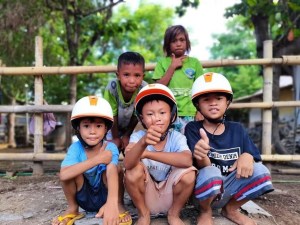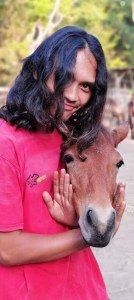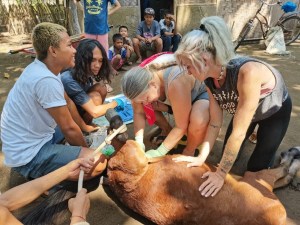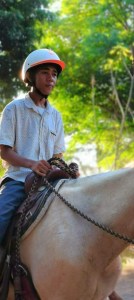It’s hard to teach old dogs new tricks, right? Even more so if there’s big odds stacked against you. Odds like culture, religion, superstition, tradition, poor education and poverty.
Horses are the only mode of transport here on the three tiny Gili islands, the locals live very simply and a lot of the horsemen are not particularly good horsemen. Teaching them new tricks – and most of the men aren’t even old – is not easy. But it’s something that Tori, my friend who runs a charity called Horses of Gili on the neighbouring island Gili T, is working hard to do.

Tori lives by a motto: changing the world one pony at a time. In normal times, Horses of Gili runs clinics a couple of times a year. Veterinarians, veterinary students and farriers come from abroad to offer first aid, worming pastes, vitamins, dental checks, free gear and general education to the horsemen here. It’s been a slow slog, but over time the men have learnt some new tricks, and animal welfare overall has improved a lot.
The clinics haven’t been possible during Covid, but the work done by Tori and HoG has increased significantly. HoG has morphed naturally (and impressively!) into a rescue centre that now even teaches local children about horse husbandry and animal welfare. Teach the children well, and maybe the ripple effect will make a lasting difference.

It’s not entirely the horsemen’s fault that animal welfare isn’t always that great here. The men are often uneducated, both formally and in their trade. Even if they did go to school for a while, Indonesia has a rather poor standard of education (studies show), particularly in remote villages. They have little comprehension of biology, physiology and biomechanics, let alone medicine. Many of them don’t understand what bacteria is. The horsemen have never read books about horses, let alone travelled out of their local region, to experience different ways of thinking. Combine that with a strong culture of following customs and traditions without question, it seems independent thinking is not the norm. And then as adults, the men work hand to mouth to put food on the table and pay for their kids to get, in turn, a limited education.
There are of course decent men that take good care of their horses here too. Perhaps more on Gili Meno where the horses don’t work as hard and I don’t see too many problems. But the good horsemen aren’t in the majority.

Until recently there was no fresh water on the islands, horses used to be given salty water from wells, which leads to kidney failure. Most horsemen don’t own fields or paddocks, so horses are kept entirely in small stalls when they aren’t working, which is bad for their mental as well as physical health. Some horsemen don’t clean the stalls and their horses stand constantly in a mountain of their own poo. Often their feet aren’t trimmed properly, which affects the biomechanics of their movement and leads to early arthritis as well as hoof diseases. Poor diet causes malnutrition, and leads to weakness and the need for early retirement. Horses are used as working animals only, they are not pets. Many of the men don’t groom their horses, let alone pat them.
Locals do a lot of what they do – training, feeding, hoof care, treatment of injuries – simply because it’s what has always been done. Even if it doesn’t work. Horsemanship skills, even if they’re crude or ineffective, are passed down from one generation to the next.
This is not just awful for the horse’s welfare, it also means these men don’t take good care of their investment. Horses are surprisingly very expensive to buy here. And in the years before HoG started having the amazing impact it has, many horses lived short working lives and then had to be sold to slaughter and replaced.
It’s often hard for people in other countries to understand the complexities of animal welfare in developing countries.
Mind you, ignorance is not reserved for the poorly educated.
In pre-Covid times, I’d often hear lovely, concerned, animal-welfare conscious tourists complain about the cruelty of still using horses for work. They’d refuse to take a horse cart to their hotel when they arrived, even though it meant walking under the hot sun, dragging their fancy big suitcases through the sand and dirt ‘roads’. Some would write bad reviews. None of that sort of behaviour made any positive difference. The tourists didn’t realise that by boycotting the horse carts, the horsemen would have less money to feed their horses. And a further irony of their naive sentiment was that they didn’t seem to question how the hammock they’d laze in, the yoga floor they’d practice on, the air conditioner they’d sleep under or the sunset cocktails they’d sip, had all been transported to their hotels by the same working horses, driven by men who often couldn’t afford to pay for electricity in the simple shacks they live in.
And worse, all too often I’d see groups of four tall, heavy tourists clamber onto one tiny horse cart meant for two people, because they were too stingy to pay for two carts (and the local horseman was too shy or polite to say anything).
There aren’t any tourists holidaying here now of course and most locals have no income, nor government support. This has some lovely benefits – life has become even more simple. For the first time in years they’ve planted crops like cassava and corn in the coconut fields. They have time to go fishing or, with no hotels to compete with, they can buy fresh caught fish from their neighbours at really good prices. It’s lovely to see families hanging out at the beach now, because they’re not busy serving guests 24/7 and they’re not worried about having to be shy around tourists (who let’s just say, behave and dress very differently on the beach to local customs).
But a serious downside from this unexpected and extended time of poverty is that the horsemen can’t afford to feed their horses. Some have had no choice but to sell them just to put food on the table and to pay for their kids’ education. They sell the horses in Lombok, where the economy isn’t reliant solely on tourism and where horse carts are still used by people who don’t own their own vehicles. Or they’re sold to slaughter. Others have managed to hold onto their horses, because when tourism eventually restarts (and the government constantly gives them ridiculous false-hope dates) they’ll need them to earn an income.
Goodness knows what would have happened without HoG. From the time Covid started and still today, Tori has struggled but manages to keep raising enough funds to buy food for all of the 200 odd horses remaining on the three Gili islands; a phenomenal effort.
Tori is a passionate, strong-minded, extremely handy and tough (with the typical marshmallow centre) horsewoman who is making a huge difference to take care of the horses here. Tori used to work as a qualified veterinary technician back in the States. She and her husband normally manage a scuba diving centre on the quiet northern beach of Gili T, which of course has been shut since Covid started.

I first met Tori when I went over to be a bystander at a horse clinic in 2015, and I’ve been over there quite a few times since to lend a hand, especially during Covid time. When I say lend a hand… trust me, Tori knows more than most vets and is more than capable of doing everything herself. I just “assist” and give my opinion on some diagnoses and treatments, help manage any anaesthetics and generally support her in the work she does.
Tori is one of those energetic people who don’t just complain naively, but who truly make a difference through their actions at grassroots level. At the dive centre where she lives she’s had a menagerie of rescued animals – civets, hedgehogs, disabled goats, exotic birds, blind cats. I used to think she was a bit like a bull at a red rag, but actually she has slowly and steadily been immersing herself in the culture here for years. And because of her respectful way of doing things with the locals, she’s slowly garnered quite a bit of influence. She’s not a vet, but all the horsemen on Gili T refer to her as the Doc.
When I first met her, she had a few ramshackle stalls and a small yard out the back of the dive centre and a couple of rescued horses. Because she was developing a reputation on the island – thanks to the free bits and vitamin injections given out at clinics (locals love vitamin injections), and some medicines and stitch-ups she did that locals could see worked – there was a small but increasing number of horsemen that started coming to her place with injured or sick horses. She started teaching them new tricks by example; by doing things for them. In the beginning they didn’t always come until after they’d tried one of their old wives’ tale remedies first. I remember her taking care of a horse with an infected cut on its leg that the owner had thrown boiling water on. Some of the men believe boiling water, or fuel, will heal a wound, but of course it also does extreme damage to the skin. The skin on this horse’s leg had almost been degloved. Stuff like this was hard to see, and frustrating as all hell, but she’d never ridicule or castigate the men; instead she’d stay cool and assertively explain to them – and show them – a kinder and more effective way.
Slowly slowly is the local way, and the only way to do things here. Locals are often proud and defensive. If, as an outsider, you try to impose your ideas and ways on them, it’s more than likely you’ll get rejected and your attempts might even bite you on the bum. Tori knows this intuitively, and she’s worked slowly slowly to pick her battles wisely, to turn a blind eye to a lot of stuff that’s hard to see, and to carefully educate the men in a way they are becoming receptive to.
Some of you might remember the poor old crippled and overworked pony, Chance, that Made and I chanced upon in Lombok a few years ago. He was being pushed to cart bricks by an elderly, very poor man who couldn’t afford to trade him in. Tori immediately set up a gofundme to rescue him (ie buy a replacement horse for the old man), she later came over on her dive boat to collect him, she nursed and rehabilitated him at the dive centre, and she found a safe forever-home where he’s now retired. To me, the way she didn’t even hesitate to do all that was astonishing.
Since then she’s rescued many more. Some with serious injuries or so sick or starved they needed hospitalisation for a while. Some that are chronically injured and won’t ever be able to work again, but she’s still saved them from slaughter.
Tori has trouble seeing any horse suffer or go to slaughter, and she firmly believes in changing the world one horse, or pony, at a time. Even with no space to take on horses she did her best to rehome them to people who cared, including some wealthier locals, who wanted paddock pets or lawnmowers.
During the wet season a couple of years ago she became totally fed up when her handful of rescues were standing in flooded stalls.
“I had to make a decision,” she told me. “Either give it up or do it properly.”
“There was no way I was going to give up.”
So she ramped up her fundraising efforts, found a small block of land to rent and built a big open barn. And at the beginning of this year she rented an empty block of land next door to it. For the first time in their lives, the horses have enough space to walk around freely at times.
This is when HoG morphed from a support charity into a rescue centre and full time clinic, and now a horse training centre as well. Because of increased injuries, hunger and illness during this Covid time, HoG now has 20 rescues in its care.
Not a day goes by that Tori doesn’t post on multiple social media platforms. It’s a constant struggle to get donations from around the world. Luckily, through friends, HoG recently started receiving support from some ‘wealthy’ and very kind contacts in China, which has been a game changer this year.
HoG now has four local staff to feed, clean stalls, groom the horses, tend to their wounds and administer medicine, and to build an endless changing arrangement of stalls and yards to accommodate newcomers. This week Tori has rented another small bit of land across the road.

A handful of expats on the island have pitched in to care for the horses. It gives them something to do during this Covid downtime.
The expats, and the four employed local guys, also give the horses love. Each time I’ve been over there, my heart-strings have been well and truly tugged to see these kind people brush and cuddle downtrodden and injured working animals that have never before received an ounce of love. In return for all the ‘work’ they do at HoG, which includes taking the horses out for walks and for swims in the ocean, a few of the expats started gently riding the healthier, recovered rescues.
Which brings me to the children.

It just so happens that a few of the rescues are tiny, the size of shetland ponies, and the kids of one of the expat helpers started to learn to ride on them. HoG’s new location is in a village in the centre of the island. Locals, including horsemen, pass by on the street and see the action. Small children from the village started drifting in through the gates to sticky-beak.
Tori’s staff, in the typical Indonesian way, were very tolerant of these ragamuffins hanging around. In a developed country it probably wouldn’t have happened. Kids don’t roam the streets on their own anymore nor waltz into neighbours’ properties uninvited. Plus there’s the insurance issues in developed countries.
The motley group of ‘parent-less’ kids grew and there’s now 20 enthusiastic little people aged 3-13 helping out each afternoon. They’re keen to ride too, but most importantly, they’re learning about horse care.



Tori embraced the chance to expose these kids to a kinder way of looking after horses. It’s nothing short of astounding, and a little hilarious, to see her give a detailed lecture on the importance of trimming and balancing hooves properly to these raggedy preschoolers and primary school kids who don’t speak any English. They sit mesmerised while she prattles away in English with a smattering of badly pronounced Indonesian words (and her staff translate for her).
Many of the horsemen on the Gilis simply replace horse-shoes without trimming the hooves. This leads to a myriad of chronic conditions. The children at HoG have seen ponies come in with appalling feet (badly overgrown toes, bleeding frogs, abscesses filled with maggots). They watch as hooves are trimmed, they see the difference it makes for horses to stand in clean bedding and have their hooves picked out daily and to walk around a paddock.
The boys (and girls!) see with their own eyes the remarkable difference when a horse that arrives as a bag of bones becomes a shiny, healthy animal with spark and energy and resilience when it’s fed well.


They work together to help pick up poo, pick-out hooves, sweep, brush ponies and carry bags of grass to them. In return they have a couple of riding lessons each week. Riding lessons are progressing slowly slowly. When I was there last week one tiny girl proudly told me she knows what the english words “walk on” mean. Everything is slowly slowly. And yet the progress made in just months is astounding.

If children here can be taught to understand animal welfare, and develop empathy – learn new tricks – and the adults in the village watch this happening even if from a distance, hopefully in time their experiences and knowledge can be passed on.
The other day Tori received two unsolicited donations – one from China and one from my generous friend Mandy in Australia – specifically to buy stuff for these kids. The kids are from poor families and basically have no toys. Tori asked me to go and do the shopping so I went to Lombok and bought 20 caps, a heap of pencils and colouring in books, playdough and some lego type educational toys.
Last week I went there to deliver the goods (I have to charter a boatman to take me across), and to check some new rescues and help Tori geld three. Local horsemen don’t geld their horses, which of course creates a lot of management problems. It was funny to see the group of little boys watching in horror as Tori cut off the testicles. But they are learning; they’ve already seen how much better the horses settle in and get along with the other horses – that horses can be with other horses as they are meant to be – after they’re gelded.

When we finished, there was a horse emergency on the other side of the island, and a horse cart came to take us there. As it pulled up outside HoG, I could see blood on the pony’s mouth. Locals sometimes use quite harsh bits, fashioned out of wire or metal rings. It’s believed by many horse people (sadly in developed countries still too) that a horse will have better brakes if the bit is severe, because it hurts when the reins are pulled. But these local handmade bits pinch and cut the horse’s lips. A couple of the rescues at HoG drop their food when they eat because they have permanently deformed and scarred lips.
Tori jumped on this opportunity to tell the horseman about kinder bits (sadly this particular trick seems really hard for them to learn) and at the same time showed the kids what was happening. Now, importantly, the riding lessons and horsemanship skills she is teaching the kids will also show them that it is possible to train a horse in a kind way (even with bitless bridles) and the horse can still have excellent brakes.

From my shopping spree, Tori will give the kids something small each week as a reward for their help and their enthusiasm. She also plans to buy food to give to their families (when she finds out who the families are). Another friend of mine here on Gili Meno makes great carry bags out of 20kg cat food sacks, and Tori will give each kid’s family a hamper in one of these handy bags.
I am so grateful the world has people like Tori. I’m grateful for her selfless and tireless dedication to the horses of the Gilis and the lasting impact I know she’s having on the local culture. She is changing the world one pony at a time, and now with help from staff and volunteers and donations, she’s also teaching the children of these islands, well.





Hi Claudia. I sail with your brother, Barry on the GC. We were talking about Indonesia and your place. What an amazing story! We saw the ponies on Gili Air last visit and wondered how they were cared (or not) for. We will be over in October and still working out if we can fit it Lombok again. If we can extend another 30 days I wouldn’t mind coming over to help the pony rescue for a week or two.
Hi Linda! Thank you so much for reading my blog and reaching out. Hope to see you in October :). Indonesia has strict rules about volunteering & visas etc, but let me know before you come and I can introduce you to Tori and we can chat about how you could help during your short visit x